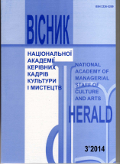UKRAINIAN CULTURAL STUDIES (UKRAINOZNAVSTVO) AS A METHODOLOGY IN TIME OF THE NATIONAL REVIVAL
DOI:
https://doi.org/10.32461/2226-3209.3.2014.138098Keywords:
Ukrainian Studies (Ukrainoznavstvo), methodology, national revival, culturology, Ukrainian Renaissance, paradigm of cultureAbstract
The common culture-processes in Ukraine at the beginning and the end of XX century caused great interest of scientists in modern research of Ukrainian national heritage. Ukrainian revival of the 20-th years of XX century marked the beginning of a powerful cultural movement that reflected the grand transformation in social and cultural life of Ukraine. Researchers: M.Hrushevsky, D. Doroshenko, J. Mazepa – associate this phenomenon with strong cultural traditions of Ukrainian national revival, originating from the Middle Ages, reaching Cossack times, continue in the XIX century in the work of Cyril and Methodians, especially, T. Shevchenko, picked up by the generation of the late XIX – early XX century by V.Antonovich, M. Drahomanov, J. Frank. Thanks to their efforts preserved the continuity of traditions that began to emerge in the 20-th years of the twentieth century and influenced the cultural processes of today's independent Ukraine.
The 20-th years of the XX century – especially in the current culture-intensive process, called the Ukrainian Renaissance. In 1918, Ukrainian National Academy headed by V. Vernadsky, decided to establish a department of
Ukrainian Studies (Ukrainoznavstvo) and to lay the foundation of Ukrainian Studies of the Academy as a methodology, objectives, philosophy and integrative principle. The term "Ukrainian Studies" (Ukrainoznavstvo), introduced M.Drahomanov, supported and developed M.Hrushevsky, S. Efremov, J. Steshenko, Doroshenko and others. This term was used to denote the sciences of Ukraine and Ukrainians’ problems (language, ethnology, history, geography) and was aimed at fostering integrity and consistency of knowledge. The promotion is due to the phenomenon of Ukrainian Studies with state-building processes in Ukraine in 1917-1920 and at the end of the twentieth century. Ukrainian Studies combined major problems not only disparate Sciences about Ukraine, Ukrainians (linguistics, ethnology, literature, ethnography, economics, medicine, geography), but also philosophical thought, religion, social and political problems, the creation of art.
Modern Ukrainian Studies is a holistic integrative postclassical science of Ukraine and Ukrainians in time and spatial, geopolitical, Ethnic, Cultural and informational dimensions. Last promotes the development model of the future development of the Ukrainian community in a knowledge of themselves as a nation and the state in the long-past times and now – in a multicultural environment and time and spatial interdependence.
Ukrainian Studies draws on interdisciplinary problem-ways of knowing science in Post-classical paradigm of postmodern culture: the structure of the model, the probability, information, functionality, system and so on. Modern
civilization processes of globalization in the independent Ukraine caused a renewed interest in Ukrainian ethodology
regarding modern humanities and education.
Revealing the contents of "Ukrainian Studies" as a scientific and academic discipline, the authors of the modern
project of Ukrainian (Ukrainian Research Institute) determining the object as a system of values and integrative
knowledge about Ukraine, its spiritual and material cost of Ukrainians as ethno-cultural, spiritual, economic, geopolitical (space-vseplanetarnu ) coherent reality in time and spatial interdependence multicultural space that promotes selfawareness, self-knowledge, self-assertion, self-identity and nation.
In modern humanities substantiates the thesis of identifying and disclosing it Ukrainoznavstvo aspect and output it to the level of a science of culture – national cultural studies. This refers to the introduction of scientific use and understanding of the vast heritage of national historiography, ethnology, art history, Ukrainian artistic philosophical and aesthetic thought, especially not sufficiently studied works of artists and scholars of the western and eastern Ukrainian diaspora.
Methodology of Ukrainian Studies enriched synergy of ideas, hermeneutics, praxeology, offers further prospects
of the domestic Ukrainian humanities and output of science and culture in the world space. It is this system require novel approaches cultural studies in the twentieth century.
Downloads
Published
Issue
Section
License
Authors who publish with this journal agree to the following terms:
1. Authors retain copyright and grant the journal right of first publication with the work simultaneously licensed under a Creative Commons Attribution License International CC-BY that allows others to share the work with an acknowledgement of the work's authorship and initial publication in this journal.
2. Authors are able to enter into separate, additional contractual arrangements for the non-exclusive distribution of the journal's published version of the work (e.g., post it to an institutional repository or publish it in a book), with an acknowledgement of its initial publication in this journal.
3. Authors are permitted and encouraged to post their work online (e.g., in institutional repositories or on their website) prior to and during the submission process, as it can lead to productive exchanges, as well as earlier and greater citation of published work (See The Effect of Open Access).


